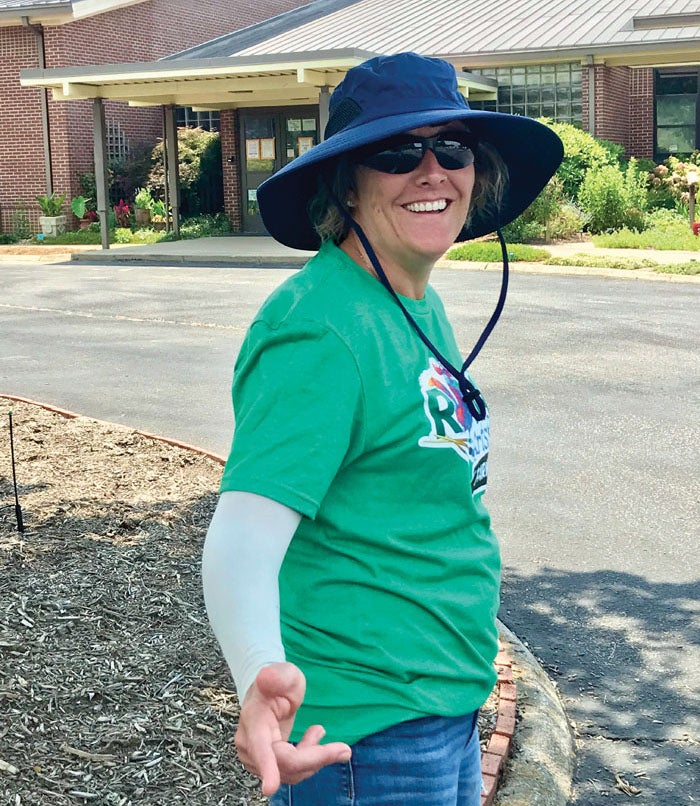Amy-Lynn Albertson: Taking precautions while gardening in the heat
Published 12:00 am Saturday, July 30, 2022

- UPF sleeves help keep you cool. Wide-brimmed hat and wrap around shades protect you from the sun.
By Amy-Lynn Albertson
N.C. Cooperative Extension
I wrote about this a year ago but with the current heat wave across the country it bears repeating. It’s essential to wear proper protection from the heat and sun when working in the garden just as much as it is on the beach. If you can, the best thing you can do is get out of the sun entirely. Get in the shade. Try to do your gardening strategically to follow the shade or the least amount of sun. Consider staying out of the sun between the hours of 10 a.m. and 2 p.m. when the sun is at its strongest.
A hat is a must-have accessory in the garden. Baseball hats are great, but a wide-brimmed hat will much more functional. Search for a hat that is at least 3 inches wide, and four inches is even better. I found a great hat at my dermatologists’ office made by Sunday Afternoons that is longer in the back and protects my neck. The sun not only damages your skin and is potentially cancerous, but direct exposure also makes you hotter. When you wear a protective layer or barrier, it will make you a few degrees cooler. A thin, loose long-sleeved shirt made from breathable material and lightweight pants can make a massive difference in the heat. Shirts made with a 50 UPF rating means it is sun-protective clothing. They are protecting against both UVA and UVB rays. A rating of UPF 50 blocks out 98% of these harmful rays.
At the Extension Center, we recently discovered reusable sleeves that can be worn with short-sleeve shirts. The sleeve has a 50 UPF, which is helpful again sun and exposure, and the material offers a cooling feature that can help combat heat exposure. The sleeves are available in a wide variety of colors. White absorbs less heat, while darker colors will tend to store heat.
The thin skin around your eyes is easily sunburnt, and UV light exposure can damage the eyes. Choose sunglasses that block 99% of UV rays and at least 75% of the light from the sun. Safety glasses that are sunglasses too will also protect your eyes from impact from flying rocks, branches and errant flying bugs.
Experts say a combination of physical barriers for sun-like hats, long sleeves, etc., and sunscreen are the best way to protect yourself from harmful rays. When shopping for sunscreens, you will see you have a choice between mineral and chemical sunscreens. Mineral sunscreens have titanium dioxide, zinc oxide or a combination of the two. These tiny particles sit on your skin and form a barrier by reflecting the sun’s rays. A chemical sunscreen works by absorbing the sun’s rays, converting the UV light into heat, and releasing it from the skin. These products often ingredients like oxybenzone. Choose a sunscreen with at least an SPF of 30 for sound protection, and make sure you reapply according to the directions or more often if you get wet or sweat a lot.
Heat stress-related illnesses are progressive. If you are working in the garden and are feeling the need to cool down, soak a bandana in cool water and wrap it around your neck.
Your neck is sensitive to temperature, and a cool, damp bandana will help cool you right down. Placing a cool, wet rag on your wrists is another good option for quick and cool relief. Heat cramps are an early sign of illness; people feel muscle pain spasms with excessive sweating. Rest and sip water or a sports drink until the cramping stops. If a person doesn’t rest when they feel heat cramps or are sweating excessively, they may progress into heat exhaustion. Their skin may look pale and feel cool and clammy. They may feel tired, dizzy or have a headache. It’s important to recognize these signs early and stop working and move to a shadier area. Loosen/remove their clothing and place wet cloths to wrists and forehead to help cool quickly. If steps are not taken, the person’s body temperature can reach 103 degrees or higher, sending them into heatstroke. Then their skin will be hot and red and maybe dry to touch. They may seem confused and become nauseous and vomit. Heatstroke is a medical emergency, and you should call 9-1-1. Cool their body with wet cloths or water but don’t give them anything to drink. Stay with them until EMS arrives.
So remember the signs and cool yourself off if you start feeling heat stress, wear good sun protection and have fun in the garden. For more information on sun protection in the garden or other horticultural topics, contact the Rowan County Extension Center at 704-216-8970.
Amy-Lynn Albertson is director for the Rowan County Extension.



